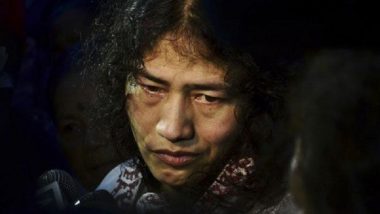Irom Sharmila, one of the most prominent faces of resistance in India, turns 47 today. On her birthday, one should revisit the life and struggle of Sharmila, who fasted for 16 years to protest against the imposition of Armed Forces Special Powers Act (AFSPA) in Manipur. The "world's longest" hunger strike earned her the title of "Iron Lady".
Facts to Know About Sharmila's Early Life
Sharmila was born on March 14, 1972 in Kongpal village of Manipur. She had seven siblings, including brothers and sisters. Her father, Late Irom Nanda Singh, was a worker at a veterinary hospital in Imphal, whereas, Sharmila's mother Irom Shakhi was a housewife.
She completed her schooling only till Class XI. Her friends claim that Sharmila was an average student, who participated in all school activities. However, she was not a crammer and did not held academic ambitions. After completing Class XI, she stopped going to school, saying that the only thing worthy to be learned is to read and write.
Sharmila, however, insisted on learning shorthand. Subsequently, she enrolled into a journalism course. After completing the course in early '90s, she began writing poetry.
This was also the period when Sharmila got in civil society members who organised peace marches and demonstrations to protest against the human rights violations in Manipur.
The Hunger Strike
On November 2, 2000, a "massacre" in Malom compelled Sharmila to launch the hunger strike. 10 civilians waiting at a bus stop were killed in the alleged unprovoked military action in Malom. The deceased, included victims of all age, including 18-year-old Sinam Chandramani, a 1988 National Bravery Award winner.
Three days later - on November 5, 2000, Sharmila sat on fast unto death to protest the imposition of AFSPA, which gives sweeping powers to the armed forces.
Sharmila was arrested and released - and the cycle continued - for innumerable times as the police charged her under "attempt to commit suicide".
Despite the legal battle, the Iron Lady did not break her resolve. By 2004, she had turned into an icon not only across the Northeast, but throughout India. She did not eat, drink and even comb her hair. Essentials, however, were supplied to her body through a nasal tube.
Sharmila also brought her protest to the national capital, as she demonstrated in Delhi and called upon the central political establishment to revoke AFSPA from Manipur.
Although her protest failed to achieve its ultimate goal, it succeeded in bringing the Centre's attention towards the alleged excesses being committed. International pressure was also drawn, as Nobel-laureate Shirin Ebadi promised to take up Sharmila's cause at the United Nations Human Rights Council.
By 2011, at least one major political party - the All India Trinamool Congress - along with dozens of civil society groups across the nation, had supported her demand of repealing AFSPA from Manipur.
In the same year, anti-corruption crusader Anna Hazare reached out to Sharmila by expressing support to her struggle. A nationwide shutdown was also called during this period demanding the Centre to accept her demand. However, the government did not relent.
In 2013, Amnesty International declared Sharmila a "prisoner of conscience", and said she "is being held solely for a peaceful expression of her beliefs". In the subsequent year, she was voted as MSN Poll's 'Top Women Icon of India'.
End of Fast & Brief Political Stint
Ahead of the 2014 Lok Sabha elections, Sharmila denied offer from two political parties to contest from the Manipur parliamentary seat on their tickets.
Two years later, however, the activist decided to end her 16-year-old hunger strike, and instead, enter the political fray to expedite her movement seeking the revocation of AFSPA.
After ending her fast on August 9, 2016, Sharmila launched a new party - People's Resurgence and Justice Alliance (PRJA), and contested against the then incumbent Manipur CM Okram Ibobi Singh from Thoubal seat in the 2017 assembly elections.
The political stint did not last long, as Sharmila suffered a crushing defeat, polling only 90 votes -- lowest among the five candidates in fray from the constituency.
Following the debut debacle, an emotional Sharmila decided to quit politics. Her note of dissent is a mirror to the society, which rejected him despite the 16 years of inhumane suffering borne by her. Here is what the Iron Lady wrote: "I don’t feel ashamed of my defeat but am fed up of elections and won’t contest again in future...It was not the result I expected. During electioneering, all the masses whom I met were sympathetic to my cause. But they ended up voting for others, due to their selfish motives."
(The above story first appeared on LatestLY on Mar 14, 2019 05:00 AM IST. For more news and updates on politics, world, sports, entertainment and lifestyle, log on to our website latestly.com).













 Quickly
Quickly


